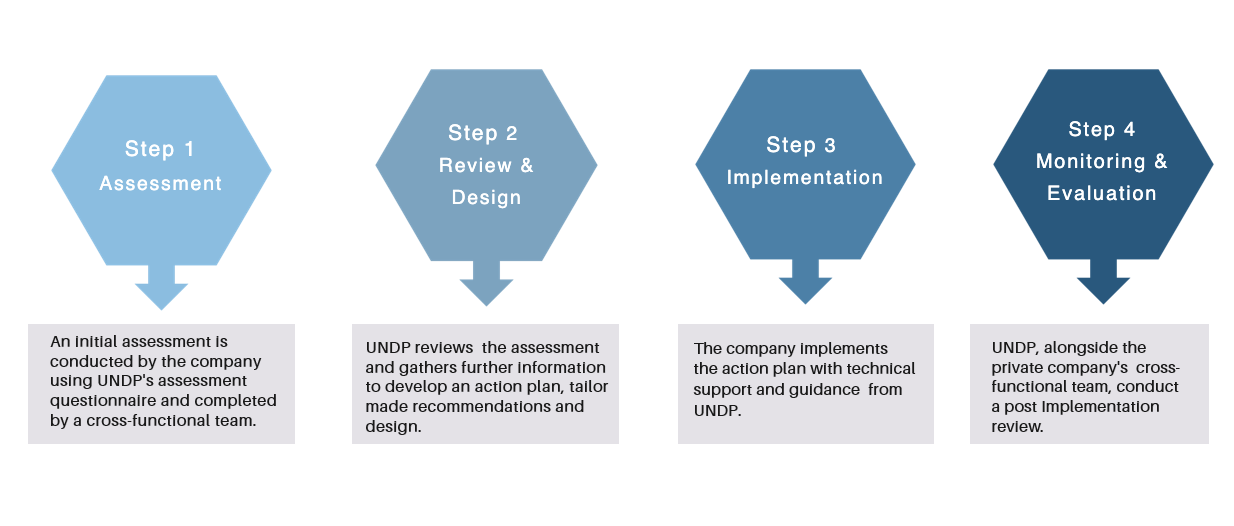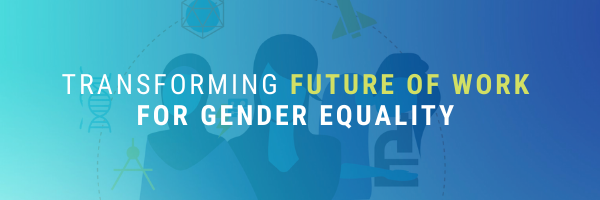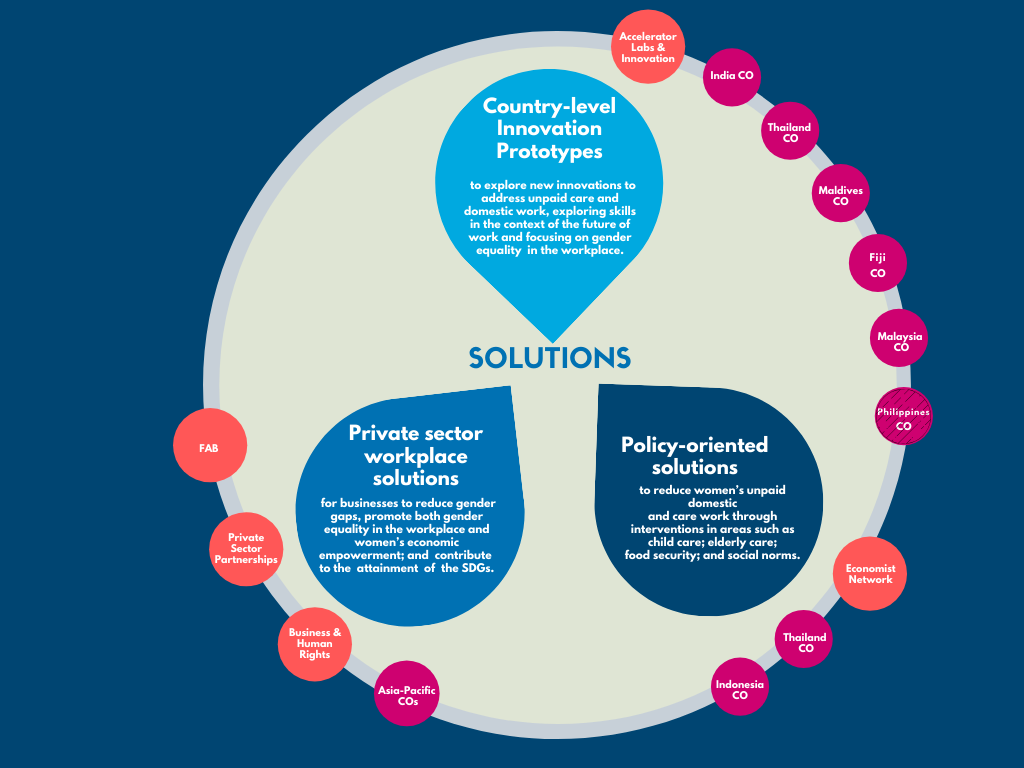Transforming the Future of Work for Gender Equality Initiative
BACKGROUND
New technology, artificial intelligence, automation, mobility, new behaviour patterns, and the gig economy are changing the dynamics of work and the skills required. Harnessing these technologies presents both opportunities for creating gender-equal economic opportunities for women, as well as important challenges. Women in particular stand to gain or lose from the future of work due to persistent gender inequality. Globally, 40 million to 160 million women might face the need to transition between occupations by 2030, often into higher-skilled roles.
Ensuring women can successfully make these transitions and that they have relevant skills in the context of future of work is a key priority for UNDP. As well as addressing the existing skills and opportunities gaps due to social and cultural norms and institutional factors shaping these choices for women from a very early stage. The need for skilling and reskilling is compounded by other factors constraining women’s equal access to economic opportunities such as the unbalanced burden of unpaid care, social norms and stereotypes, and workplace inequality.
The same norms and values which discourage women from participating in the labour force, limit their ability to rise to leadership roles, and discriminate against them by not being paid an equal wage for equal work, also play a role in influencing individual and collective behaviours around issues of sexual harassment and violence, sexism, or other forms of discrimination based on gender.
Through research and work in the region, UNDP has identified the common thread fueling these issues to be the underlying social and cultural norms that normalize gender inequality. This requires interventions that move beyond one-sided strategies and solutions that simultaneously address the perceptions that justify this inequality along with skilling, enhancing employment opportunities, leveraging technological advances in favor of gender equality.
TFOW4GE PROPOSES THREE TRANSFORMATIVE AND STRATEGIC SOLUTIONS
Through learning from experimentation, TFoW4GE has pioneered in framing a complex challenge such as gender equality in the future of work, understand system dynamics, identify leverage points for change, to then articulate/visualize a desired future system, and identify solutions and pathways forward. During 2019, UNDP focused on testing these potential solutions. This led to a process of designing a holistic set of solutions that simultaneously engage the private sector, governments, communities, and civil society to better address challenges women face in the present and that are most likely to exacerbate inequalities in the context of the future of work.
The three solutions have inter-linkages through UNDP’s work in generating evidence and policy advocacy, addressing systemic barriers through behaviour change campaigns and tackling institutional barriers to women’s economic empowerment.
POLICY ORIENTED SOLUTIONS
TFoW4GE is leveraging UNDP’s expertise and strength in policy formulation and guidance by creating a policy guide demonstrating how to formulate policy options to reduce the burden of unpaid work disproportionately shouldered by women. The disproportionate burden of unpaid work has been cited as a major barrier to women's full and equal participation in political, social and economic activities, not only undermining women's human rights. BRH's policy guidance articulates the need for a comprehensive set of policies addressing the availability of public and private services, supportive infrastructure, social norms and perceptions that are keeping women disproportionately in unpaid domestic and care work. The policy guidance note urges us to transform the existing ecosystem and gendered power dynamics, rather than just promoting women's empowerment if we are to make sustainable gender equality a reality. In 2020, BRH is providing technical guidance and support to the Country Office in Indonesia and Thailand to validate the utility of the guidance note.
PRIVATE SECTOR WORKPLACE SOLUTIONS
UNDP has developed the Sustainable Development Services (SDS) Gender Equality, Diversity, and Inclusion programme to advance the sustainable development agenda and foster business performance in gender equality. The programme provides a tool for private enterprises to come together and contribute towards the achievement of the Sustainable Development Goals (in particular, SDGs 5, 8, 10 and 17) by reducing gender gaps and promoting gender equality and competitiveness simultaneously, for inclusive and sustainable growth. The programme invites companies to go from commitment to action and provide hard evidence of gender mainstreaming efforts to tackle the most pressing gender inequalities.
The SDS programme has a four-step approach focusing on assessment, review and design, implementation and monitoring and evaluation. By incorporating a gender perspective into a company’s overall management system, businesses integrate comprehensive measures to change their regulations, operations, business processes, organisational structure, and culture, creating fairer and more decent conditions for workers.

The programme offers an innovative approach to help private sector companies increase employee satisfaction, take advantage of all worker's potential (regardless of sex) and have a more inclusive, healthier and equal work environment. It also has a solid framework based on ILO conventions, international regulations on human rights and women’s rights, the Women’s Empowerment Principles and sustainable business practices. The SDS programme and the support UNDP provides are structured around 11 key areas identified as crucial to enable a normative, operational and social transformation.
11 Key Areas of Improvement
- RECRUITMENT AND RETENTION
- EQUAL PAY AND WAGES
- PROMOTION
- TRAINING
- INTERNAL AND EXTERNAL COMMUNICATIONS
- WORK-LIFE BALANCE
- PREVENTION AND TREATMENT OF SEXUAL HARASSMENT AND GENDER BASED HARASSMENT
- SUPPLY CHAINS
- LGBTI
- CRISIS MANAGEMENT AND EMPLOYEE PROTECTION
COUNTRY-LEVEL SOLUTION PROTOTYPES
As part of the TFoW4GE initiative, UNDP is supporting five countries including India, Fiji, Malaysia, Maldives, and Thailand to pilot solution prototypes that are exploring new innovations to address unpaid care and domestic work, exploring skills in the context of the future of work and focusing on gender equality in the workplace. While the prototypes are still in progress, it is worthy to note some early opportunities.
The prototypes have ventured to apply forward looking strategies and methods such as behavioural insights tools to understand and better design interventions to address social norms that perpetuate gender inequalities. UNDP in Maldives is leveraging behavioural insights tools to increase young girl's participation in STEM-related fields. The solution prototype aims to address social and cultural barriers that limit a girl’s career aspirations in STEM to increase their knowledge and build confidence to undertake STEM-related education and jobs. UNDP is working with BIT, a team specializing in behavioural insights, to create and pilot “nudges” to understand what kind of behavioural change campaign can spark the intended change. Even though it is in its initial stages; insights are being drawn that will help develop practical and actionable interventions.
In India, UNDP is working to change social norms around the responsibility of unpaid care through childcare centers that serve the dual-purpose of providing a much-needed service such as institutional care and support systems for children to enable women with young children to pursue economic opportunities. To this end, the childcare centers also serve as business incubators to connect women with employment and entrepreneurship opportunities. This specific intervention is resulting in a change in behaviour from women and men in the communities to view childcare as a shared responsibility, thus, husbands are supporting women to participate in economic and entrepreneurship opportunities. Changes in gender equality need to happen in people's’ perceptions, behaviors and the social norms they uphold.
In Malaysia, low levels of education and skilling alongside unpaid care work and socio-cultural norms restrict women’s access to economic opportunities. If women’s burden of unpaid care work is addressed, women will have more economic opportunities. BRH is supporting Malaysia CO The to conduct research on policy gaps in recognizing, reducing, redistributing women’s unpaid care work; and piloting technology and community-based interventions that can support the testing of new alternatives towards reducing the burden of unpaid work. The prototype is currently in the research stage and will be conducting the pilot phase later this year. Through a partnership with S&P, Malaysia is also exploring using a technology app-based task-fulfillment demand/supply matching model to decrease women’s unpaid care burden as part of its pilot phase. The initiative is also working to leave no one behind in the future of work and is using digital finance tools to ensure women’s access to economic opportunities.
In Fiji, UNDP is working with a multidisciplinary team to leverage digital finance tools to reach women in rural areas. The prototype has redefined the PAC FARMER application through a Human-Centered Design process, to redesign an existing digital finance tool in order to increase its relevance and usage among rural women market vendors and rural women micro-entrepreneurs in Fiji. Through this intervention, we have seen indications of a change in perceptions amongst rural women micro-entrepreneurs to be inclined to accessing digital financing tools as a tool to increase productivity and financial gains.
In Thailand, BRH is supporting the CO to improve the employability of women living with disability to be economically self-sufficient. To achieve this, structural barriers need to be tackled by way of providing digital skills training to women living with disability as well as promoting employer-oriented practices in middle-size private companies on disability inclusion and hiring practices. Towards this end, Thailand Country Office leveraged the strong private sector engagement in the country to organize a business network meeting to create an informal network of companies that champion disability-inclusive policies. Simultaneously, Thailand CO created a curriculum for digital literacy training for women living with disabilities which was piloted with 15 participants in December. As the next step, UNDP Thailand is looking to see how rapid digital literacy training for women living with disabilities can be utilized by institutions in other parts of the country and how the informal network created during the business network meeting can translate into concrete commitments from private sector companies.
Early Opportunities
These interventions are resulting in changed behaviours to view childcare as a shared responsibility, breaking stereotypes which cause occupational segregation on gender lines, digital and financial skilling of more than 200 women in the region, including women with disability, and increased access to digital financial tools for rural women. It is also noteworthy that each of the countries is using innovative participatory methods, including design thinking workshops and behavioural insights tools and strategies to further this work in the future.
More broadly, the insights gained through the prototype implementation offer a platform for cross-fertilization amongst Country Offices in the region considering the design of more comprehensive interventions to create systemic change as a means to unlocking women's participation in the labour force.
TFoW4GE Phase 2
During the next phase of the initiative, UNDP BRH will provide targeted support to Country Offices to accelerate implementation and scaling through a multi-faceted approach and cross-team collaboration to design evidence-based portfolio responses that will holistically address the intersecting challenges identified, and engage innovation to scale. UNDP BRh is also working to pilot the Sustainable Development Services | Gender Equality, Diversity and Inclusion tool for private sector in the Asia-Pacific regionals well as validate the Policy Guide on Unpaid Care.
After the implementation of the country prototypes, the regional gender team at the Bangkok Regional Hub organized a Regional Lab that brought together the cohort of five Country Offices implementing the TFOW4GE solution prototypes, gender focal points, Accelerator Lab colleagues, and financial inclusion specialists to use the insights from the prototypes to discuss opportunities and design potential service offerings, combining assets and capabilities from Country Offices and the region.
After months of continuous work and learning based on the prototype and regional lab, we are exploring strategic opportunities to continue addressing some of the persistent drivers of gender inequality in the context of the new normal. This crisis provides us with an opportunity to build forward differently, one that is inclusive, resilient, and works for all.


 Locations
Locations